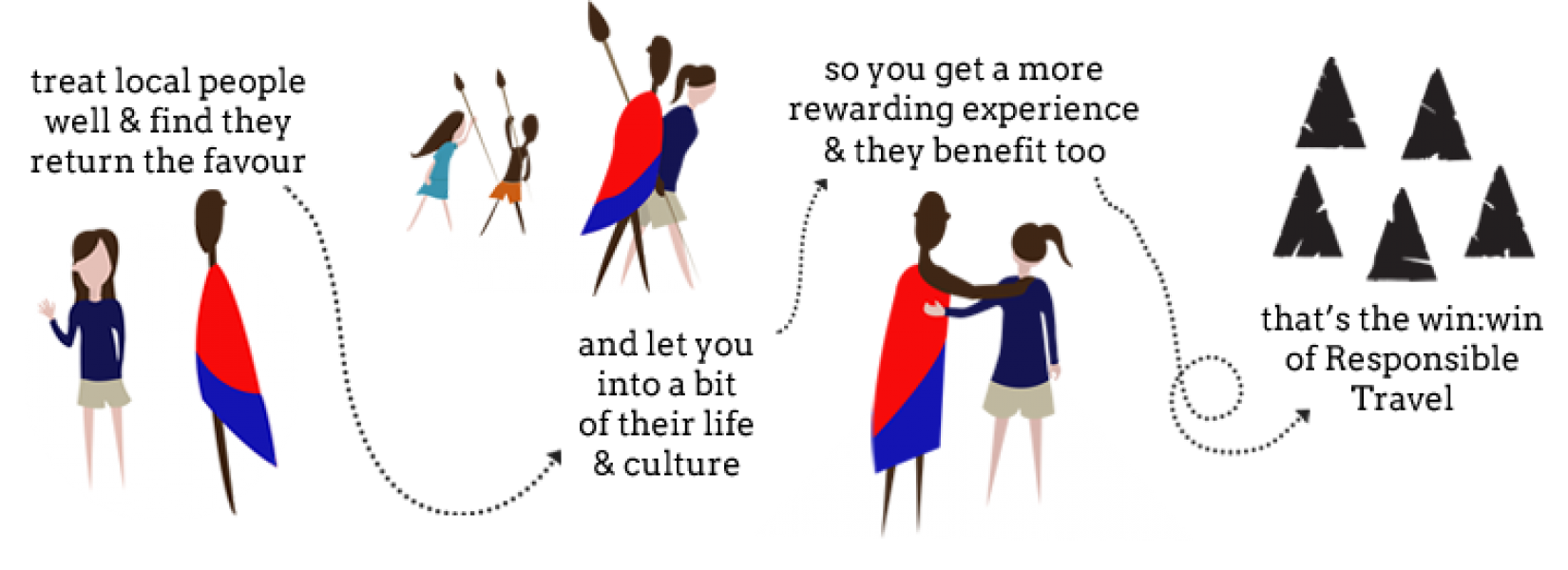Responsible Tourism in Destinations:
What is Responsible Tourism?
Responsible Tourism was defined in Cape Town Conference on Responsible Tourism in Destinations in 2002 by the Responsible Tourism Partnership and Western Cape Tourism alongside the World Summit on Sustainable Development in Johannesburg. The conference raised the issue of Responsible Tourism in Destinations in the form of declaration known as Cape Town Declaration, and have agreed by the World to adopt it. In brief, as per this conference, the Responsible Tourism is about “making better places for people to live in and better places for people to visit.” This means taking responsibility for making tourism more sustainable.
Who are required to be involved?
All the tourism authorities, the governments, travel and tourism agencies/operators, entrepreneurs in the tourism industry, nature and national parks conservation authorities, hoteliers, local people and tourists themselves need to be involved in taking action for making tourism more responsive and sustainable. Therefore, the world of travel market has implemented the Cape Town Declaration for its World Responsible Tourism Day encouraging the travel industry to demonstrate their responsibility for making tourism more sustainable.
What should be done?
Since the Responsible Tourism is more of evidence based, hence, the recognition and criticism have to be supported by the evidence(s). However, sustainable tourism focuses more on the performance of people, businesses and governments to positively maximize the economic, social and environmental impacts of tourism. This is done by identifying, addressing and reporting to resolve the issues transparently for the economic development of the local, indigenous people and the place through tourism. The adopted Cape Town Declaration highlights more about the features of the declaration.
Some Excerpts from Responsible Tourism Partnership Org.:
Cape Town Declaration
In 2002, Cape Town Conference was held and defined the Responsible Tourism in Destinations and agreed upon a declaration know as Cape Town Declaration having the following characteristics:
- minimizes negative economic, environmental, and social impacts;
- generates greater economic benefits for local people and enhances the well-being of host communities, improves working conditions and access to the industry;
- involves local people in decisions that affect their lives and life chances;
- makes positive contributions to the conservation of natural and cultural heritage, to the maintenance of the world’s diversity;
- provides more enjoyable experiences for tourists through more meaningful connections with local people, and a greater understanding of local cultural, social and environmental issues;
- provides access for physically challenged people;
- and is culturally sensitive, engenders respect between tourists and hosts, and builds local pride and confidence.
Guiding Principles for Economic Responsibility
- Assess economic impacts before developing tourism and exercise preference for those forms of development that benefit local communities and minimise negative impacts on local livelihoods (for example through loss of access to resources), recognising that tourism may not always be the most appropriate form of local economic development.
- Maximise local economic benefits by increasing linkages and reducing leakages, by ensuring that communities are involved in, and benefit from, tourism. Wherever possible use tourism to assist in poverty reduction by adopting pro-poor strategies.
- Develop quality products that reflect, complement, and enhance the destination.
- Market tourism in ways which reflect the natural, cultural and social integrity of the destination, and which encourage appropriate forms of tourism.
- Adopt equitable business practises, pay and charge fair prices, and build partnerships in ways in which risk is minimised and shared, and recruit and employ staff recognising international labour standards.
- Provide appropriate and sufficient support to small, medium and micro enterprises to ensure tourism-related enterprises thrive and are sustainable.
Guiding Principles for Social Responsibility
- Actively involve the local community in planning and decision-making and provide capacity building to make this a reality.
- Assess social impacts throughout the life cycle of the operation – including the planning and design phases of projects – in order to minimise negative impacts and maximise positive ones.
- Endeavour to make tourism an inclusive social experience and to ensure that there is access for all, in particular vulnerable and disadvantaged communities and individuals.
- Combat the sexual exploitation of human beings, particularly the exploitation of children.
- Be sensitive to the host culture, maintaining and encouraging social and cultural diversity.
- Endeavour to ensure that tourism contributes to improvements in health and education.
Guiding Principles for Environmental Responsibility
- Assess environmental impacts throughout the life cycle of tourist establishments and operations – including the planning and design phase – and ensure that negative impacts are reduced to the minimum and maximising positive ones.
- Use resources sustainably, and reduce waste and over-consumption.
- Manage natural diversity sustainably, and where appropriate restore it; and consider the volume and type of tourism that the environment can support, and respect the integrity of vulnerable ecosystems and protected areas
- Promote education and awareness for sustainable development – for all stakeholders.
- Raise the capacity of all stakeholders and ensure that best practice is followed, for this purpose consult with environmental and conservation experts.
The conference called upon all the responsible government bodies of the nation, multilateral agencies, tourism stakeholders, enterprises, etc. to develop similar practical guidelines and encourage tourism operators, businesses, local communities and tourists to take responsibility for developing sustainable tourism and help create better places for people to live in and for people to visit.
“We all have a responsibility to make a difference by the way we act!”

